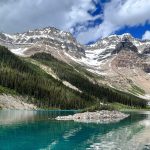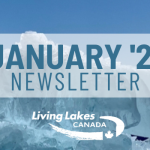Help Living Lakes Canada identify Water Concerns in your community
Columbia Basin, BC — Have you noticed lower water levels in your favourite creek? Are you worried about your community’s water supply? Do you have questions about how climate change will impact local fish populations?
If you have concerns around water in your region, you’re not alone. The Columbia Basin is vulnerable to climate change which is altering our water cycle. Disappearing glaciers, record-breaking summer temperatures, prolonged dry periods and extreme flooding all have serious repercussions for our communities and ecosystems.
Living Lakes Canada is seeking ongoing public input to understand community concerns and priorities around freshwater, and everyone is welcome to contribute. The feedback collected will help inform the selection of water monitoring sites for a project that’s tracking climate impacts on water. The data collected will support communities and industry in adaptation planning for inevitable changes to water supply. This initiative has been developed in alignment with Indigenous and non-Indigenous government water monitoring priorities.
A series of eight community meetings will take place in the following communities for what’s known as the “Upper Kootenay” and “Lower Columbia-Kootenay” Hydrologic Regions.
REGISTER for an Upper Kootenay meeting (see map):
- Wasa Lake (February 8, 7-8:30 pm)
- Cranbrook (February 9, 2-3:30 pm)
- Jaffray (February 21, 7-8:30 pm)
- Online via Zoom (March 8, 2-3:30 pm)
REGISTER for a Lower Columbia-Kootenay (see map):
- Trail (February 15, 7-8:30 pm)
- Nelson (February 23, 7-8:30 pm)
- Creston (March 7, 2-3:30 pm)
- Online via Zoom (April 4, 2-3:30 pm)
These meetings will be interactive sessions where participants can provide their feedback on local water concerns and monitoring priorities, and ask questions about the Columbia Basin Water Monitoring Framework project that’s being facilitated by Living Lakes Canada.
“Understanding the impact of climate change on the East Kootenay water supply is crucial for making important decisions on how to monitor changes to streams, creeks, rivers and lakes in the area,” said Nowell Berg, Upper Kootenay Local Reference Group Coordinator for the project. “People are invited to attend a public meeting to share their knowledge and concerns about water in the region.”
For those unable to attend any of the meetings, feedback can be submitted through an online survey tool.
- To attend an Upper Kootenay meeting or to receive the online survey, REGISTER HERE. Questions can be directed at Upper Kootenay Local Reference Group Coordinator Nowell Berg at uk.lrg@livinglakescanada.ca.
- To attend a Lower Columbia-Kootenay meeting or to receive the online survey, REGISTER HERE. Questions can be directed at Lower Columbia-Kootenay Local Reference Group Coordinator Bill Coedy at lck.lrg@livinglakescanada.ca.
“Through this project we are collaborating with local groups to expand our water monitoring network so we can work with communities and all levels of government to protect our watersheds. Community perspectives and insights are a valued part of the monitoring network design,” said Bill Coedy, Lower Columbia-Kootenay Local Reference Group Coordinator for the project. “We welcome public input to ensure that the expanded monitoring network addresses local water concerns.”
For more information about the Columbia Basin Water Monitoring Framework project, including a full-length report on the project’s 2022 pilot implementation in the Columbia Valley, Elk River Valley and Slocan Valley/North Kootenay Lake regions, visit www.livinglakescanada.ca/cbwmf.






[…] Columbia Kootenay region and have concerns about freshwater, please consider attending the final online community meeting on April 4th, 2-3:30 pm PT to help inform the selection of water monitoring […]